The slow and deadly dzud in Mongolia (dzud: 혹한과 혹서 등을 동반한 이상한 날씨)
- 14 May 2016
- Asia
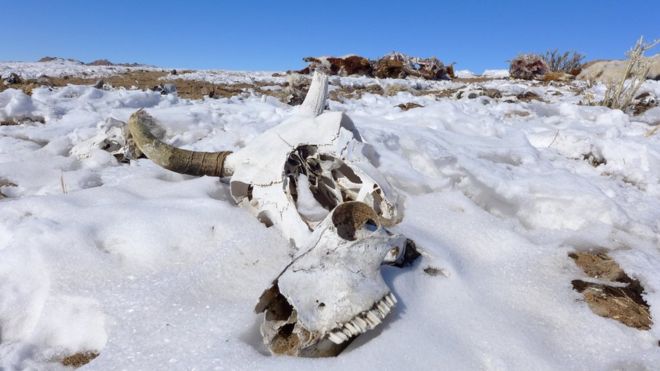 HELEN WRIGHT
HELEN WRIGHTSo far this year, more than one million animals have been killed by the dzud. The word conjures up an image of a mythical monster, but it is a peculiar weather phenomenon and the fear of herders on the Mongolian steppes, as journalist Helen Wright reports. (conjures up: ~을 생각나게 하다. 떠오르게 하다) (herders: 목부, 목동, 목자)
The piles of dead, frozen sheep and goats lie stacked against the rocks, just out of sight. (stacked: 잔뜩 쌓인)
They are victims of the dzud, an unseen and brutal natural disaster unique to Mongolia where a summer drought combines with a harsh winter and vast numbers of livestock die from either starvation or cold.
The last dzud in 2010 killed eight million animals. It is thought to descend in five-yearly cycles and each time it wreaks havoc. (wreaks havoc: 아수라장으로 만들다. 황폐하게 하다)
"We are trying so hard to keep them alive," 50-year-old herder Bayankhand Myagmar says, talking about her dead sheep and goats. "But nothing we do is working."
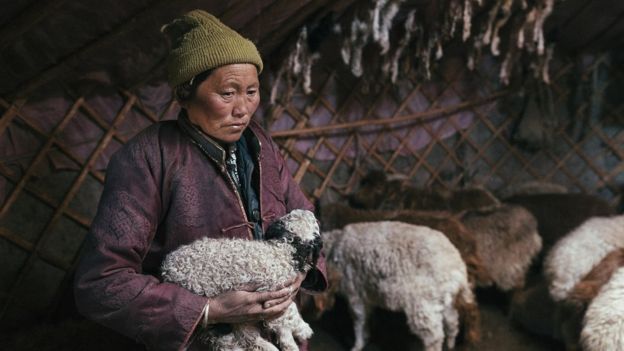 IFRC
IFRCIn Mongolia it hasn't rained since last July and this winter temperatures dropped to as low as -50C for days on end. Snowfall covered up to 60% of the country and fell heavier than usual.
The dzud is made worse by overgrazing and a creeping desertification. Without rain grass is unable to grow across the vast steppes in summer and the millions of animals that live on them cannot put on enough weight to survive the winter cold. So they die. This winter more than 255,000 people have been affected by the dzud. (overgrazing: 과도한 방목) (creeping desertification: 서서히 진행되는 사막화) (creep: 살금살금 움직이다) (steppe = grassland 목초지) (put on weight: 살찌다) (동물들이 동사하는 이유는 겨울이 오기 전 가뭄으로 먹이를 충분히 섭취하지 못해, 동면을 위해 몸을 불릴 수 없기 때문.)
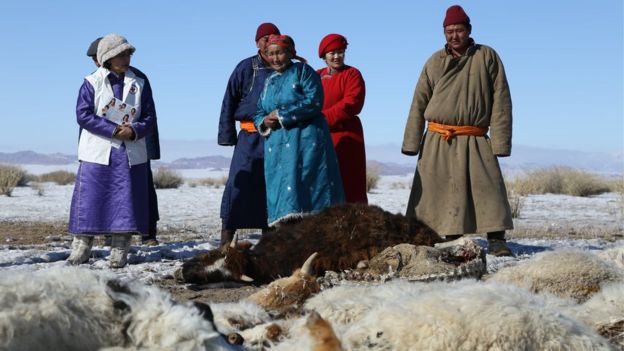 IFRC
IFRCWhen an animal's health is more important than its owner's 가축의 주인보다 가축의 목숨이 더 중요한 때가 지금
Bayankhand lives in Uvs Province, more than 1,000km (621 miles) west of the country's capital Ulan Bator. She has been a herder since 1990 and this is the worst dzud she has lived though. She has already lost more than 450 of her 700 animals.
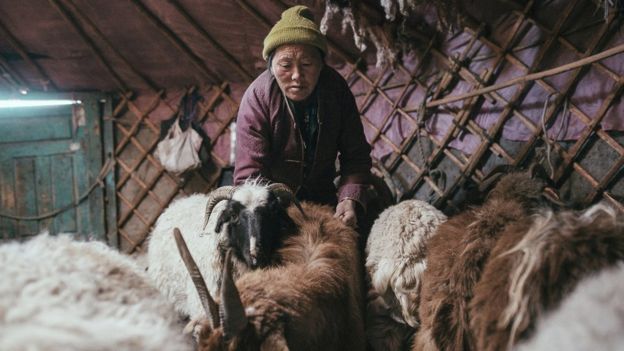 ICRC
ICRCSitting inside her ger, a traditional round house, which she shares with her disabled daughter and son, she cries as she says: "If we lose all of the animals, we will have nothing to live on."
The family are putting the animals' health above their own and 20 of the weakest animals stay inside the tent. But outside, several sheep are tied to the ground and their sides heave as they struggle to breathe. 가축의 목숨을 가족보다 더 중시할 정도로 절박한 사정.
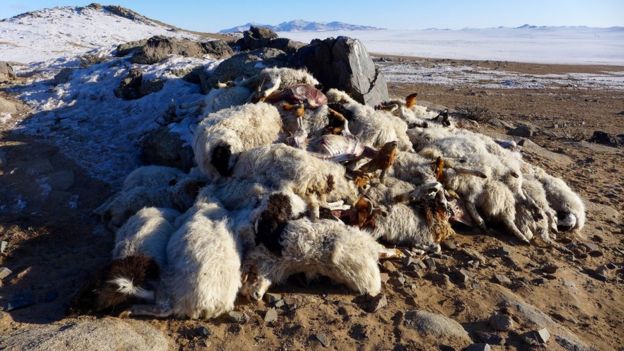 HELEN WRIGHT
HELEN WRIGHTBayankhand says she gets up four to five times a night to check on her remaining animals as they tend to sleep in a pile and can suffocate.
She has already sold her car to pay for more hay this winter and is now in debt with local markets after buying more. 불을 지펴 가축을 동사시키지 않기 위해 차량까지 팔아버림. 이젠 빚더미.
"What will we do if we lose all of them?"
Aid officials warn that nobody pays attention to this silent killer, but the impact is severe.
Herders rely on their animals for almost everything: for meat and milk, they burn their waste to heat their homes and sell their skins to buy food and pay children's school and university fees. Losing their animals can mean they fall into poverty. 목부들에게 가축은 전재산. 고기, 우유, 내장은 땔감, 표피는 판매하여 음식 구입하거나 자녀의 학비로 쓰임.
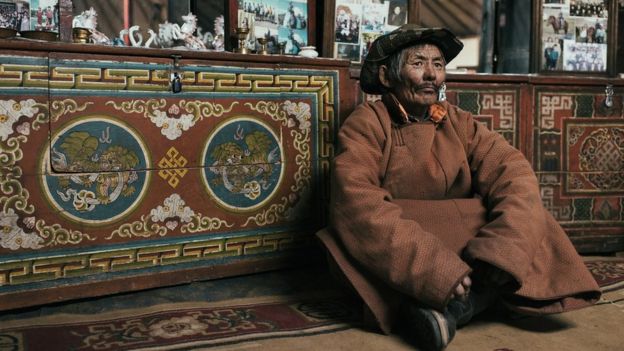 IFRC
IFRCOften, with no other choice, they migrate to a district centre or the capital, which is home to more than half of the country's 2.8 million people. But there they have no skills to get a job.
The emergency begins when meat gets cheap
Dogoonoo lives with 13 others in three small gers in Uvs Province. The 72-year-old started this winter with 230 livestock but 210 of those have died since January.
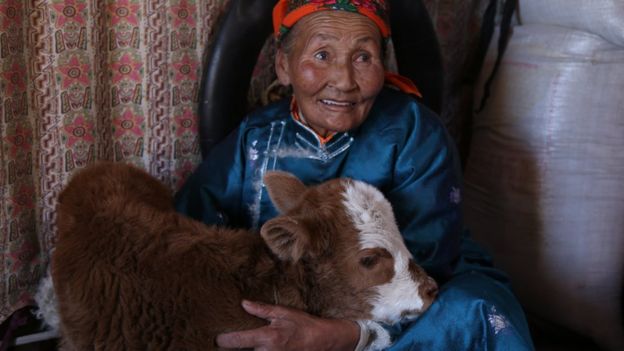 IFRC
IFRC"Watching the animals die is breaking us apart," she said. "But even if I have only one animal left, I will do everything in my power to keep it alive."
Aid agencies in the country say if there is a summer drought, then there will be a dzud the following winter. But several are now trying to change when a dzud is officially recognised and the triggers for help are released. 드줏은 여름 가뭄후 찾아오는 겨울철 혹한을 의미.
This year the government has not called the situation in the country an emergency, so it is less easy to appeal to international organisations for help. 몽고정부는 비상사태를 선포하지 않아 국제사회에 도움을 청하기가 쉽지 않음.
"In Mongolia there seems to be the attitude that you don't look forward if a bad winter is predicted, because that only encourages the bad dzud," Kevin Gallagher, deputy representative in Mongolia to the Food and Agricultural Organisation of the United Nations, says.
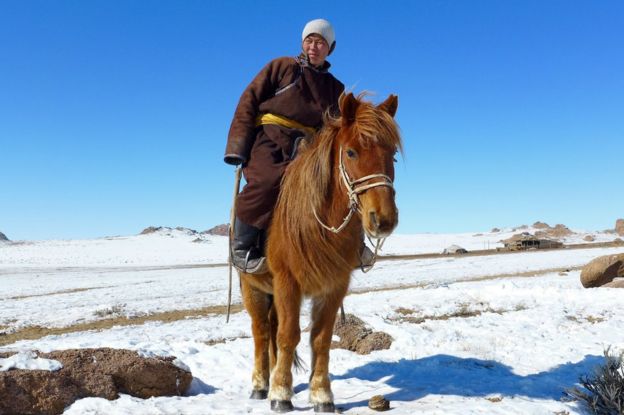 HELEN WRIGHT
HELEN WRIGHT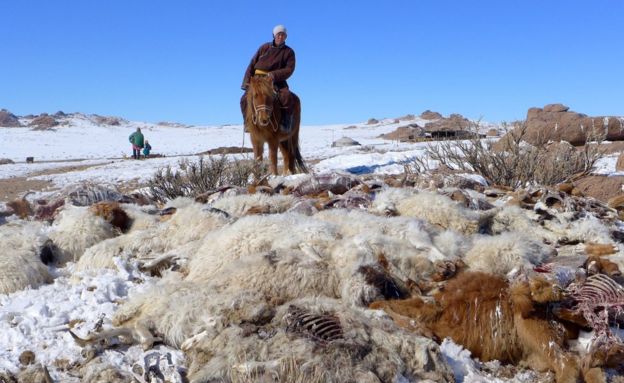 HELEN WRIGHT
HELEN WRIGHTHe would like the triggers to start after a summer drought but before the snow starts to fall, as well as when the price of meat drops to 25% of its value. When this happens banks start to recall their loans to herders, which eventually means herders are left without feed to buy for their animals. This trigger already occurs in other parts of the world.
Last autumn, as winter approached, herders slaughtered millions of their animals to try and sell them for meat. They already knew the weak would not make it through. This caused the price to drop from $75 to $25 for a sheep as the market became oversaturated and the cycle of insolvency for herders was set off.
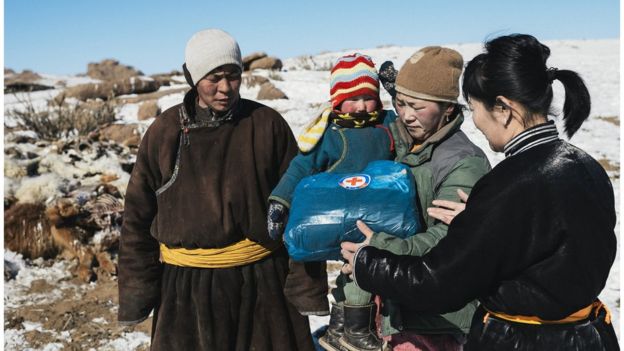 IFRC
IFRCEven though the coldest months have now passed new grass will not grow on the steppes until late May and an estimated 1,000 animals a day will continue to die until then.
So with each dzud, the traditional lifestyle of the herders on the steppes becomes that much more unfeasible.
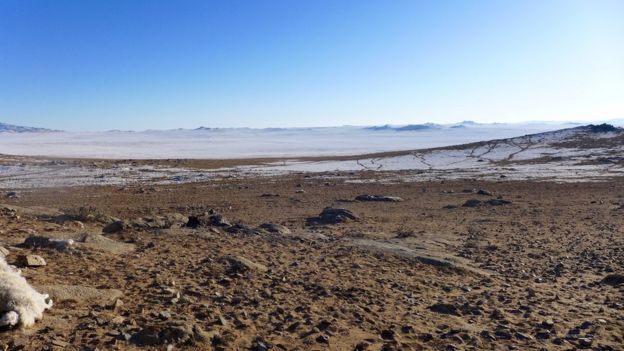 HELEN WRIGHT
HELEN WRIGHT